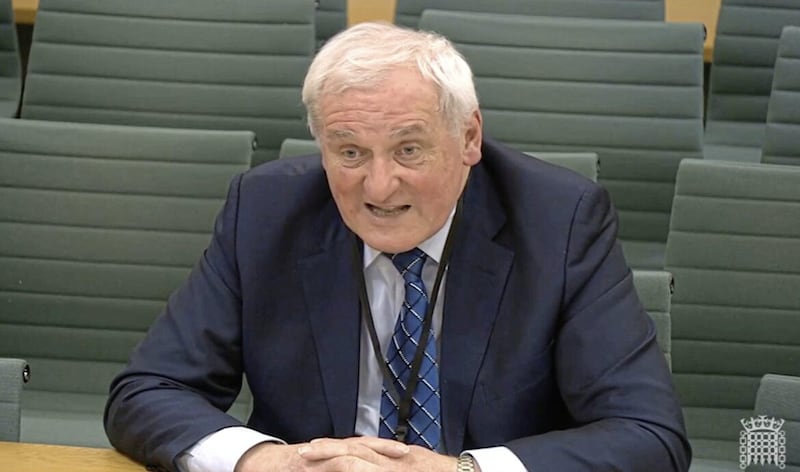Last week Bertie Ahern popped up to say the rules for the runners and riders at Stormont should be changed.
Bertie is trying to prove that there’s life after political death. Fianna Fáil have resurrected him for the upcoming Good Friday Agreement anniversary because the only surviving Irish leader from that time is Gerry Adams and the Irish government couldn’t allow Adams to be the sole contemporary glad-handing Blair, Clinton and Biden next month.
Thus Bertie is obliging with his views on the current DUP-sponsored crisis. Naturally, being Bertie Ahern, he goes along with the voguish view – up to a point. He’s simultaneously in favour and not in favour of changing the rules governing executive formation.
Yes, it should happen, but not before an assembly election and the parties have to agree, so it won’t happen, so…. As the former Trotskyist TD Joe Higgins said, asking Ahern questions is like playing handball against a haystack: you hear a dull thud and the ball doesn’t come back.
Nevertheless, there’s always a germ of truth in what Ahern says. In this case of course in an ideal world, or at least in a desirable one, the system needs reform, but it isn’t going to happen. It isn’t going to happen because neither Sinn Féin nor the DUP will agree and why would they?

The whole concept of the Good Friday Agreement is based on the theory of consociationalism, that is the representatives of the two main communities cooperating to run this place.
It’s in place elsewhere, is never easy and never works smoothly. Belgium, divided mainly between Flemings and Walloons but with a German minority, has been in the Guinness Book of Records twice in the last decade for having the longest period without a government: first for 541days from 2010 and then over 600 days from December 2018.
In the Lebanon, with three main communities, it’s much worse. As of the weekend they now have two time zones because there’s no agreement on when to put the clocks forward.
Remember, both those countries are independent states (though many Flemings don’t accept there is a Belgian state) with real governments, not a Ruritanian, glorified county council like here.
The bien-pensants can witter on all they like about, all together now, the growth of the middle ground, but it’s wishful thinking – a cop out. The inescapable fact is that 80 per cent of voters opt for nationalist or unionist parties. Like all politico-ethnic problems this place is a divided society and political mechanisms have to be devised to cater for that reality.
Just look at the most recent unapologetic examples: the antics in Mid and East Antrim council area, or Mid-Ulster, where DUP intolerance can’t even thole a sign that says ‘Fáilte go Páirc an Mhuilinn’. The very antithesis of consociationalism, where you attempt to obliterate any manifestation of ‘themuns’.
The fashionable appeal for changes in the rules, from the Alliance Party in particular, is simply an expression of the naïve belief that you can have what people call ‘normal politics’ here. You can’t because this is not a normal place. It was artificially devised to exploit maximum division. Unionists need maximum division for their creation to survive.
Those innocents who think that if you tinker with the rules, the DUP will obey those new rules any more than they respect the existing ones, are more to be pitied than laughed at. After an election in which the DUP will emerge as the main unionist party does anyone seriously believe they can be denied a major role at Stormont?
Does anyone seriously believe that they won’t filibuster, stage sit-ins and walk-outs, conduct procedural guerrilla war at Stormont? In short, render the place unworkable.
If unionists, even though they’re a minority and even though this place was created for them, refuse to allow it to work, there’s one inescapable conclusion and it’s not changing the rules.









